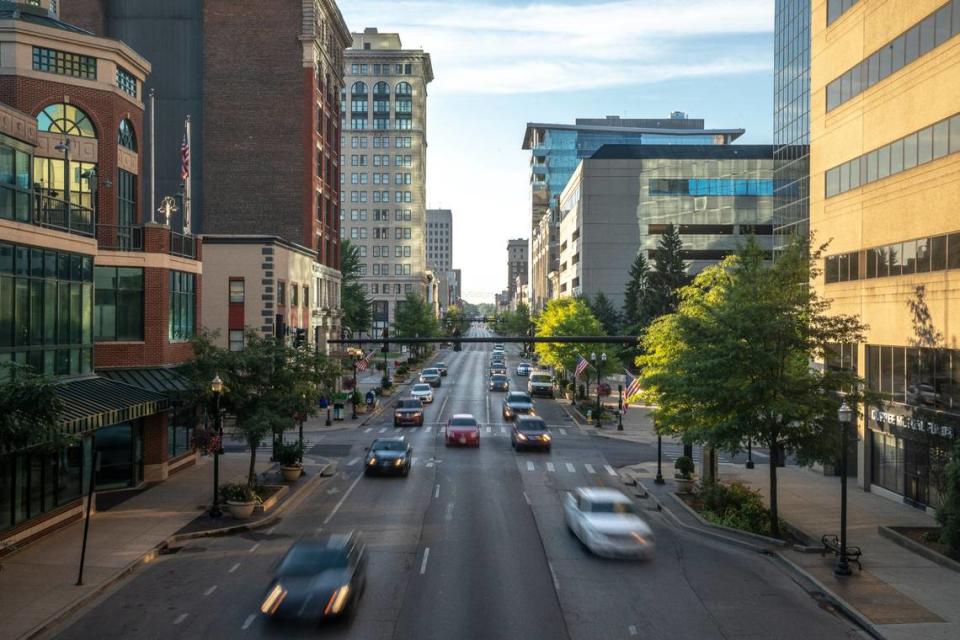Why are Lexington business leaders in Salt Lake City? ‘We’ve got to up our game.’
Ignore the map and population charts: There are a lot of similarities between Salt Lake City and Lexington.
That’s according to Commerce Lexington President and CEO Bob Quick. The things that put Salt Lake City on the map, he said, are things Lexington already has. But there are lessons in that Utah city and the region around the Great Salt Lake that will benefit all of central Kentucky.
Despite Salt Lake being more than twice the size of Lexington in terms of metropolitan population, Quick said there is potential in the tech industry, quality of life and internal workings in central Kentucky. The challenge: The area just needs to share it.
That’s why Quick is leading a delegation of around 170 business, education, government and nonprofit leaders who will be in the Utah capital until June 7 studying examples of success from the city and its major players. They left Lexington on Wednesday.
Commerce Lexington, an organization that promotes economic development, job creation and business growth in Lexington and its surrounding regions, is looking for ways to replicate Salt Lake City’s growth.
Quick said one of the main goals of the trip would be identifying the positive things that Salt Lake City has done to help its growth, but conversation with leaders about what they would change sometimes helps more.
“Sometimes the challenge makes them better, stronger, but also initially can have a little bit of a setback,” Quick said.
Telling a better story of Lexington
Quick highlighted Salt Lake City’s ability to showcase itself to the surrounding area and the rest of the country. It’s one of his main focuses over the next few days. His wish: How do you improve the “messaging” about Lexington’s reputation as an economic hub in central Kentucky?
“We do an OK job, but we’ve got to up our game there,” he said. “We’ve got to do a much better job of telling folks outside of our region why (they should choose) Lexington, central Kentucky.”
With roots in the horse, tech, automotive and healthcare industries, Quick wants to develop new ways to highlight everything Lexington has to offer for both businesses and families.
“We just have to do a much better job of connecting all of our pieces together, but then also making sure that the public knows what’s out there and what’s available,” he said.
Potential in the tech industry
Provo/Orem, located just outside Salt Lake City, earned the top spot on the U.S. Census Bureau’s report of the fastest-growing cities from 2016-2022. The area is home to a technological and entrepreneurial hub called the “Silicon Slopes;” a play on California’s Silicon Valley.
“Salt Lake City has a thriving tech sector and is well-known for it,” Quick said.
Centered around Lehi, Utah, and between Salt Lake City and Provo, the slopes are seen as a growing hub of tech employment and startup formations. Finding ways to support Lexington’s tech sector will be a key focus of the trip and the future of Lexington. .
“People are really shocked when they find out how extensive our biotech sector is,” Quick said. “It’s really huge; again it goes back to the storytelling. We’ve got to do a better job of telling that.”

Shaping Lexington’s future
Central Kentucky has benefited from these visits to other cities.
Several program, such as Thursday Night Live, the EMERGE Conference for Emerging Leaders, Commerce Lexington’s Minority Business Development Program and Access Loan Small Business Financing Initiative and the recent Courageous Conversations movement, developed from these out-of-town conversations.
While these programs don’t happen overnight, Quick said conversations started in Utah will carry over into the future of Lexington.
“When we’re in a community, we’ll look at what they did well and it may be community-wide, it may be public sector driven,” he said. “Also, we have a lot of folks that come from the private sector and/or the nonprofit sector.”

 Yahoo Finance
Yahoo Finance